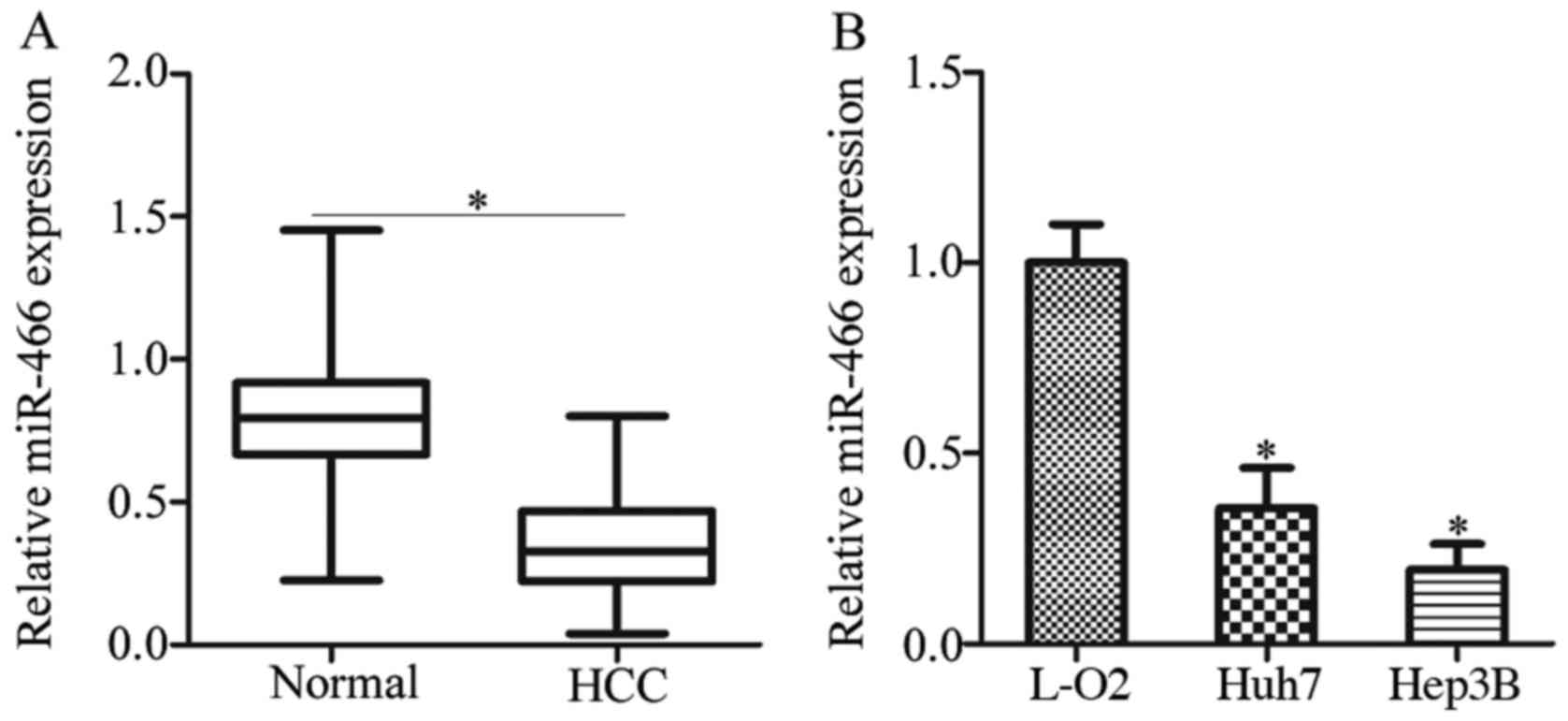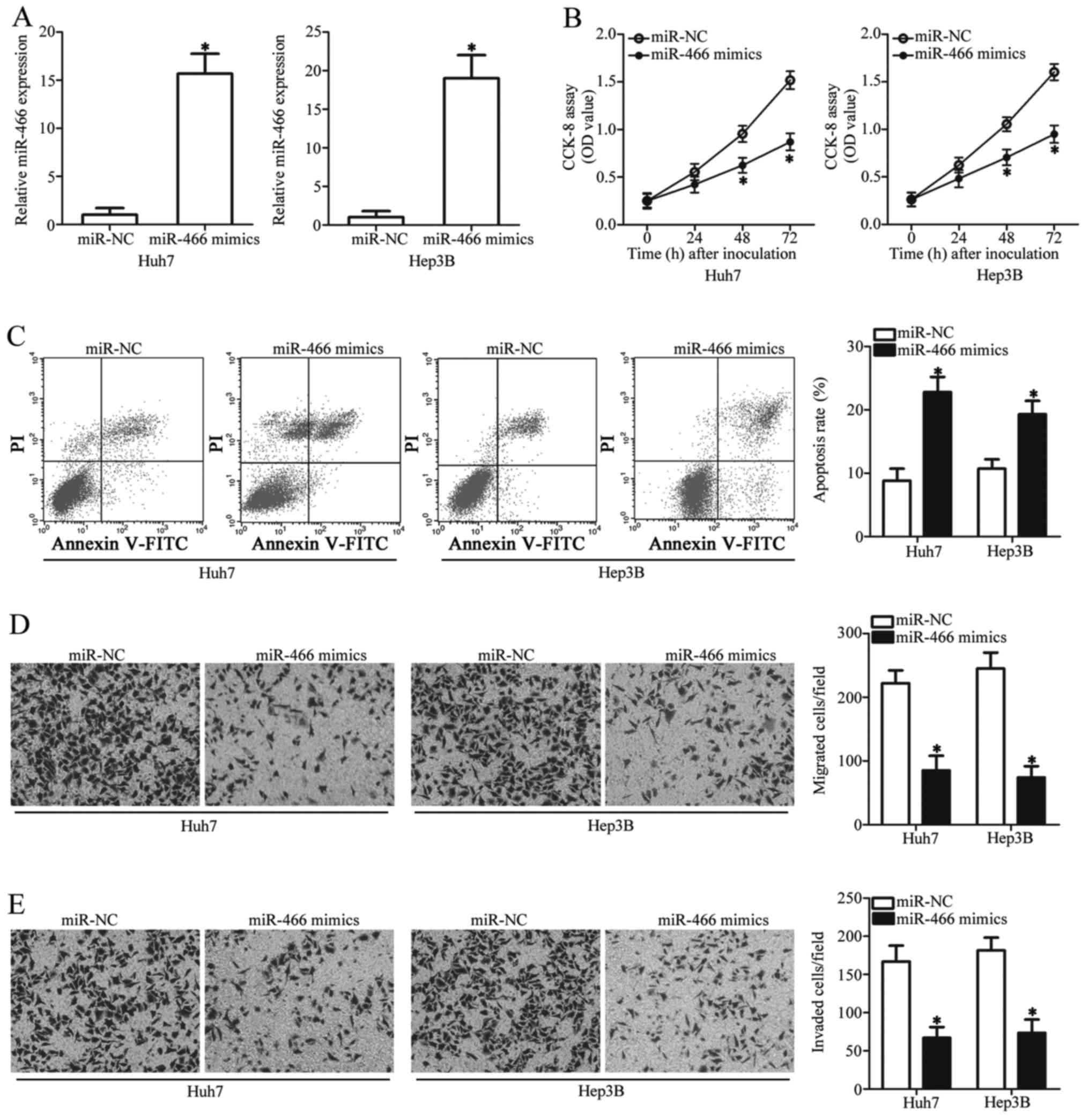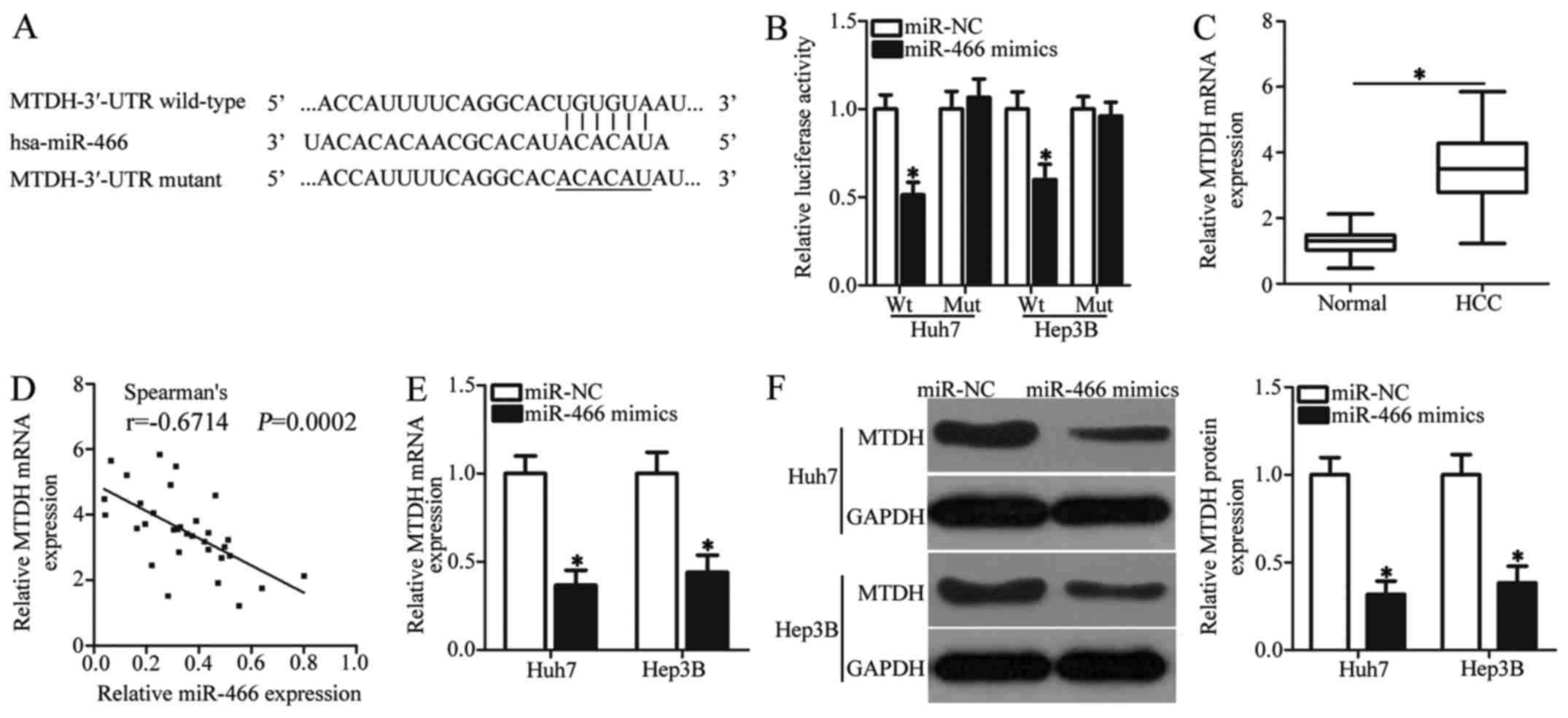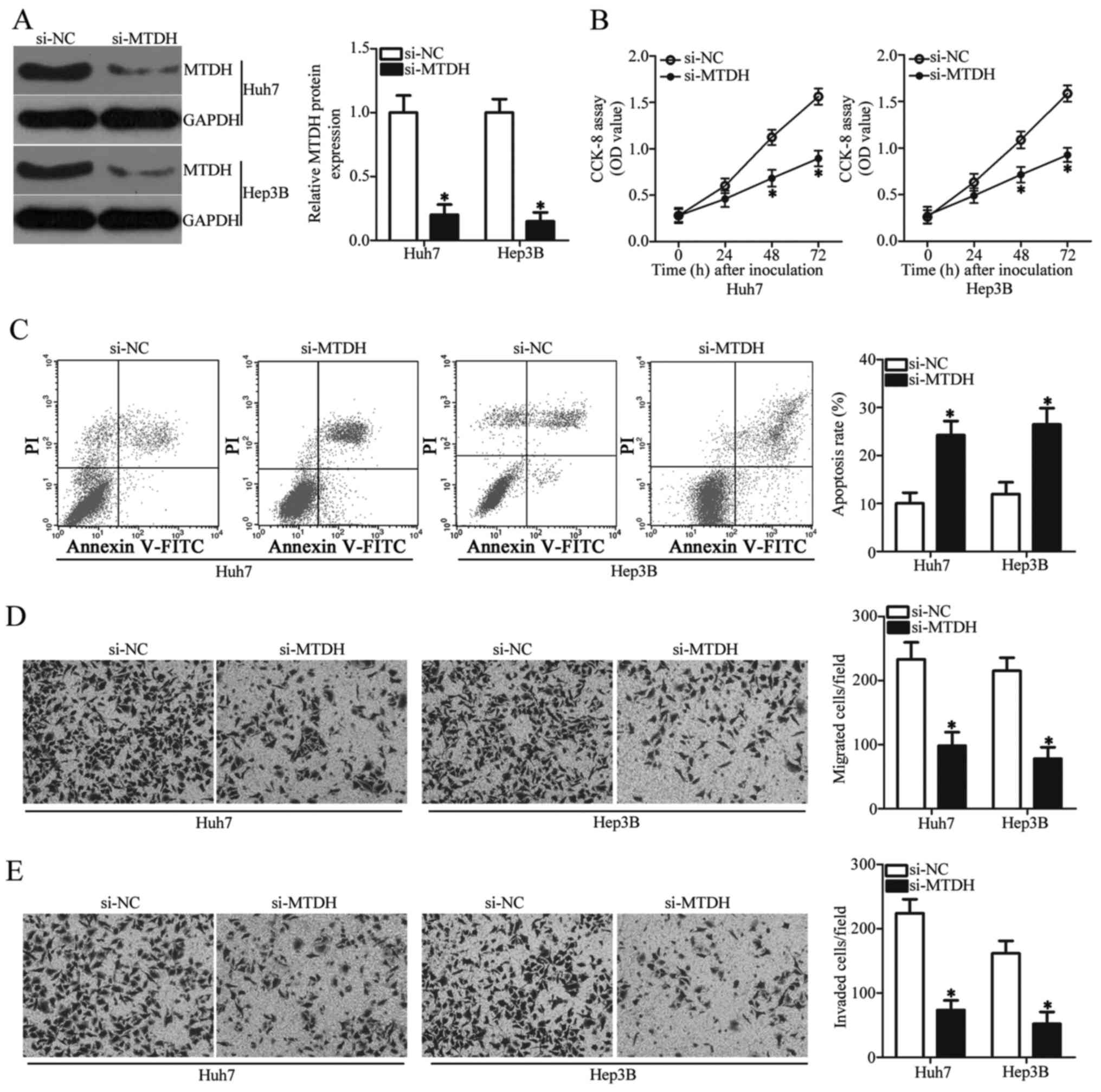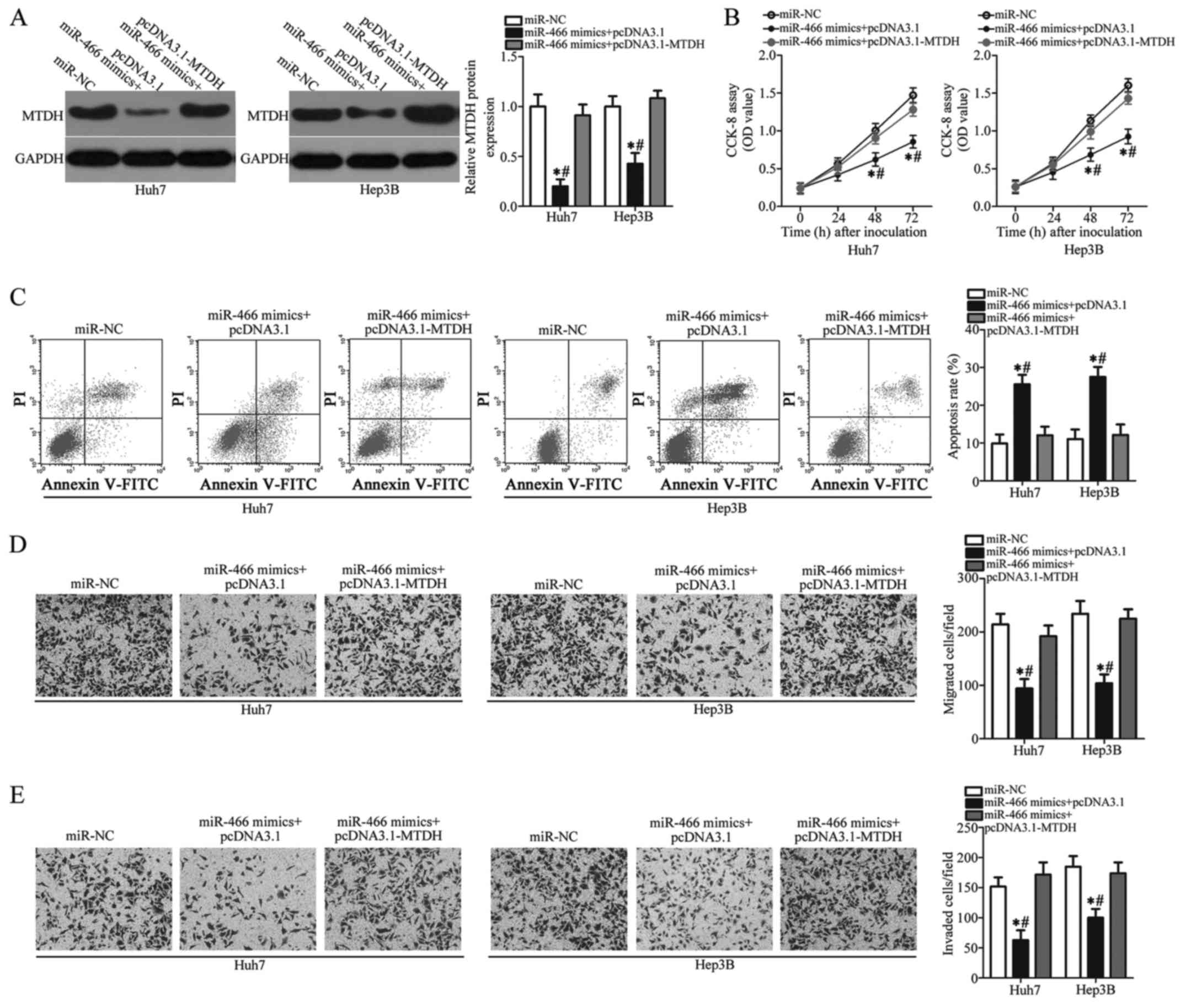|
1
|
Torre LA, Bray F, Siegel RL, Ferlay J,
Lortet-Tieulent J and Jemal A: Global cancer statistics, 2012. CA
Cancer J Clin. 65:87–108. 2015. View Article : Google Scholar : PubMed/NCBI
|
|
2
|
Chen W, Zheng R, Baade PD, Zhang S, Zeng
H, Bray F, Jemal A, Yu XQ and He J: Cancer statistics in China,
2015. CA Cancer J Clin. 66:115–132. 2016. View Article : Google Scholar : PubMed/NCBI
|
|
3
|
Global Burden of Disease Cancer
Collaboration, . Fitzmaurice C, Allen C, Barber RM, Barregard L,
Bhutta ZA, Brenner H, Dicker DJ, Chimed-Orchir O, Dandona R, et al:
Global, regional, and national cancer incidence, mortality, years
of life lost, years lived with disability, and disability-adjusted
life-years for 32 cancer groups, 1990 to 2015: A systematic
analysis for the global burden of disease study. JAMA Oncol.
3:524–548. 2017. View Article : Google Scholar : PubMed/NCBI
|
|
4
|
Galun D, Basaric D, Zuvela M, Bulajic P,
Bogdanovic A, Bidzic N and Milicevic M: Hepatocellular carcinoma:
From clinical practice to evidence-based treatment protocols. World
J Hepatol. 7:2274–2291. 2015. View Article : Google Scholar : PubMed/NCBI
|
|
5
|
Ercolani G, Grazi GL, Ravaioli M, Del
Gaudio M, Gardini A, Cescon M, Varotti G, Cetta F and Cavallari A:
Liver resection for hepatocellular carcinoma on cirrhosis:
Univariate and multivariate analysis of risk factors for
intrahepatic recurrence. Ann Surg. 237:536–543. 2003. View Article : Google Scholar : PubMed/NCBI
|
|
6
|
Nguyen VT, Law MG and Dore GJ: Hepatitis
B-related hepatocellular carcinoma: Epidemiological characteristics
and disease burden. J Viral Hepat. 16:453–463. 2009. View Article : Google Scholar : PubMed/NCBI
|
|
7
|
Yates LA, Norbury CJ and Gilbert RJ: The
long and short of microRNA. Cell. 153:516–519. 2013. View Article : Google Scholar : PubMed/NCBI
|
|
8
|
Hammond SM: An overview of microRNAs. Adv
Drug Deliv Rev. 87:3–14. 2015. View Article : Google Scholar : PubMed/NCBI
|
|
9
|
Xie B, Ding Q, Han H and Wu D: miRCancer:
A microRNA-cancer association database constructed by text mining
on literature. Bioinformatics. 29:638–644. 2013. View Article : Google Scholar : PubMed/NCBI
|
|
10
|
Bishop KS, Xu H and Marlow G: Epigenetic
regulation of gene expression induced by butyrate in colorectal
cancer: Involvement of MicroRNA. Genet Epigenet.
9:1179237X177299002017. View Article : Google Scholar : PubMed/NCBI
|
|
11
|
Wang X, Ivan M and Hawkins SM: The role of
MicroRNA molecules and MicroRNA-regulating machinery in the
pathogenesis and progression of epithelial ovarian cancer. Gynecol
Oncol. 147:481–487. 2017. View Article : Google Scholar : PubMed/NCBI
|
|
12
|
Zhou K, Liu M and Cao Y: New Insight into
microRNA functions in cancer: Oncogene-microRNA-tumor suppressor
gene network. Front Mol Biosci. 4:462017. View Article : Google Scholar : PubMed/NCBI
|
|
13
|
Yi PS and Li JS: High expression of miR-21
is not a predictor of poor prognosis in all patients with
hepatocellular carcinoma. Mol Clin Oncol. 8:733–739.
2018.PubMed/NCBI
|
|
14
|
Ding W, Tan H, Li X, Zhang Y, Fang F, Tian
Y, Li J and Pan X: MicroRNA-493 suppresses cell proliferation and
invasion by targeting ZFX in human hepatocellular carcinoma. Cancer
Biomark. 22:427–434. 2018. View Article : Google Scholar : PubMed/NCBI
|
|
15
|
Han G, Zhang L, Ni X, Chen Z, Pan X, Zhu
Q, Li S, Wu J, Huang X and Wang X: MicroRNA-873 promotes cell
proliferation, migration, and invasion by directly targeting TSLC1
in hepatocellular carcinoma. Cell Physiol Biochem. 46:2261–2270.
2018. View Article : Google Scholar : PubMed/NCBI
|
|
16
|
Chen Z, Zuo X, Zhang Y, Han G, Zhang L, Wu
J and Wang X: miR-3662 suppresses hepatocellular carcinoma growth
through inhibition of HIF-1α-mediated Warburg effect. Cell Death
Dis. 9:5492018. View Article : Google Scholar : PubMed/NCBI
|
|
17
|
Yu Z, Lin X, Tian M and Chang W:
microRNA196b promotes cell migration and invasion by targeting
FOXP2 in hepatocellular carcinoma. Oncol Rep. 39:731–738.
2018.PubMed/NCBI
|
|
18
|
Sun X, Wang M, Liu H and Wang J:
MicroRNA-423 enhances the invasiveness of hepatocellular carcinoma
via regulation of BRMS1. Am J Transl Res. 9:5576–5584.
2017.PubMed/NCBI
|
|
19
|
Zhu W, Qian J, Ma L, Ma P, Yang F and Shu
Y: miR-346 suppresses cell proliferation through SMYD3 dependent
approach in hepatocellular carcinoma. Oncotarget. 8:65218–65229.
2017.PubMed/NCBI
|
|
20
|
Jiang D, Cho W, Li Z, Xu X, Qu Y, Jiang Z,
Guo L and Xu G: miR-758-3p suppresses proliferation, migration and
invasion of hepatocellular carcinoma cells via targeting MDM2 and
mTOR. Biomed Pharmacother. 96:535–544. 2017. View Article : Google Scholar : PubMed/NCBI
|
|
21
|
Tong F, Ying Y, Pan H, Zhao W, Li H and
Zhan X: MicroRNA-466 (miR-466) functions as a tumor suppressor and
prognostic factor in colorectal cancer (CRC). Bosn J Basic Med Sci.
18:252–259. 2018.PubMed/NCBI
|
|
22
|
Colden M, Dar AA, Saini S, Dahiya PV,
Shahryari V, Yamamura S, Tanaka Y, Stein G, Dahiya R and Majid S:
MicroRNA-466 inhibits tumor growth and bone metastasis in prostate
cancer by direct regulation of osteogenic transcription factor
RUNX2. Cell Death Dis. 8:e25722017. View Article : Google Scholar : PubMed/NCBI
|
|
23
|
Zhou LL, Shen Y, Gong JM, Sun P and Sheng
JH: MicroRNA-466 with tumor markers for cervical cancer screening.
Oncotarget. 8:70821–70827. 2017.PubMed/NCBI
|
|
24
|
Livak KJ and Schmittgen TD: Analysis of
relative gene expression data using real-time quantitative PCR and
the 2(-Delta Delta C(T)) method. Methods. 25:402–408. 2001.
View Article : Google Scholar : PubMed/NCBI
|
|
25
|
Zheng J, Li C, Wu X, Yang Y, Hao M, Sheng
S, Sun Y, Zhang H, Long J and Hu C: Astrocyte elevated gene-1 is a
novel biomarker of epithelial-mesenchymal transition and
progression of hepatocellular carcinoma in two China regions.
Tumour Biol. 35:2265–2269. 2014. View Article : Google Scholar : PubMed/NCBI
|
|
26
|
Zhu K, Dai Z, Pan Q, Wang Z, Yang GH, Yu
L, Ding ZB, Shi GM, Ke AW, Yang XR, et al: Metadherin promotes
hepatocellular carcinoma metastasis through induction of
epithelial-mesenchymal transition. Clin Cancer Res. 17:7294–7302.
2011. View Article : Google Scholar : PubMed/NCBI
|
|
27
|
Gong Z, Liu W, You N, Wang T, Wang X, Lu
P, Zhao G, Yang P, Wang D and Dou K: Prognostic significance of
metadherin overexpression in hepatitis B virus-related
hepatocellular carcinoma. Oncol Rep. 27:2073–2079. 2012.PubMed/NCBI
|
|
28
|
Ahn S, Hyeon J and Park CK: Metadherin is
a prognostic predictor of hepatocellular carcinoma after curative
hepatectomy. Gut Liver. 7:206–212. 2013. View Article : Google Scholar : PubMed/NCBI
|
|
29
|
Yoo BK, Emdad L, Su ZZ, Villanueva A,
Chiang DY, Mukhopadhyay ND, Mills AS, Waxman S, Fisher RA, Llovet
JM, et al: Astrocyte elevated gene-1 regulates hepatocellular
carcinoma development and progression. J Clin Invest. 119:465–477.
2009. View
Article : Google Scholar : PubMed/NCBI
|
|
30
|
Srivastava J, Siddiq A, Emdad L,
Santhekadur PK, Chen D, Gredler R, Shen XN, Robertson CL, Dumur CI,
Hylemon PB, et al: Astrocyte elevated gene-1 promotes
hepatocarcinogenesis: Novel insights from a mouse model.
Hepatology. 56:1782–1791. 2012. View Article : Google Scholar : PubMed/NCBI
|
|
31
|
Sarkar D: AEG-1/MTDH/LYRIC in liver
cancer. Adv Cancer Res. 120:193–221. 2013. View Article : Google Scholar : PubMed/NCBI
|
|
32
|
Zhu HD, Liao JZ, He XX and Li PY: The
emerging role of astrocyte-elevated gene-1 in hepatocellular
carcinoma (Review). Oncol Rep. 34:539–546. 2015. View Article : Google Scholar : PubMed/NCBI
|
|
33
|
Mao B and Wang G: MicroRNAs involved with
hepatocellular carcinoma (Review). Oncol Rep. 34:2811–2820. 2015.
View Article : Google Scholar : PubMed/NCBI
|
|
34
|
Yao M, Wang L, Yao Y, Gu HB and Yao DF:
Biomarker-based MicroRNA therapeutic strategies for hepatocellular
carcinoma. J Clin Transl Hepatol. 2:253–258. 2014.PubMed/NCBI
|
|
35
|
Lyra-González I, Flores-Fong LE,
González-Garcia I, Medina-Preciado D and Armendáriz-Borunda J:
MicroRNAs dysregulation in hepatocellular carcinoma: Insights in
genomic medicine. World J Hepatol. 7:1530–1540. 2015. View Article : Google Scholar : PubMed/NCBI
|
|
36
|
Shi SQ, Ke JJ, Xu QS, Wu WQ and Wan YY:
Integrated network analysis to identify the key genes,
transcription factors, and microRNAs involved in hepatocellular
carcinoma. Neoplasma. 65:66–74. 2018. View Article : Google Scholar : PubMed/NCBI
|
|
37
|
Su ZZ, Kang DC, Chen Y, Pekarskaya O, Chao
W, Volsky DJ and Fisher PB: Identification and cloning of human
astrocyte genes displaying elevated expression after infection with
HIV-1 or exposure to HIV-1 envelope glycoprotein by rapid
subtraction hybridization, RaSH. Oncogene. 21:3592–3602. 2002.
View Article : Google Scholar : PubMed/NCBI
|
|
38
|
Li J, Zhang N, Song LB, Liao WT, Jiang LL,
Gong LY, Wu J, Yuan J, Zhang HZ, Zeng MS and Li M: Astrocyte
elevated gene-1 is a novel prognostic marker for breast cancer
progression and overall patient survival. Clin Cancer Res.
14:3319–3326. 2008. View Article : Google Scholar : PubMed/NCBI
|
|
39
|
Gnosa S, Shen YM, Wang CJ, Zhang H,
Stratmann J, Arbman G and Sun XF: Expression of AEG-1 mRNA and
protein in colorectal cancer patients and colon cancer cell lines.
J Transl Med. 10:1092012. View Article : Google Scholar : PubMed/NCBI
|
|
40
|
Li WF, Wang G, Zhao ZB and Liu CA: High
expression of metadherin correlates with malignant pathological
features and poor prognostic significance in papillary thyroid
carcinoma. Clin Endocrinol (Oxf). 83:572–580. 2015. View Article : Google Scholar : PubMed/NCBI
|
|
41
|
Yang G, Zhang L, Lin S, Li L, Liu M, Chen
H, Cao M, Liu D, Huang YR and Bo J: AEG-1 is associated with tumor
progression in nonmuscle-invasive bladder cancer. Med Oncol.
31:9862014. View Article : Google Scholar : PubMed/NCBI
|
|
42
|
Shi X and Wang X: The role of MTDH/AEG-1
in the progression of cancer. Int J Clin Exp Med. 8:4795–4807.
2015.PubMed/NCBI
|
|
43
|
Hu G, Wei Y and Kang Y: The multifaceted
role of MTDH/AEG-1 in cancer progression. Clin Cancer Res.
15:5615–5620. 2009. View Article : Google Scholar : PubMed/NCBI
|
|
44
|
Zhao Y, Moran MS, Yang Q, Liu Q, Yuan C,
Hong S and Kong B: Metadherin regulates radioresistance in cervical
cancer cells. Oncol Rep. 27:1520–1526. 2012.PubMed/NCBI
|















